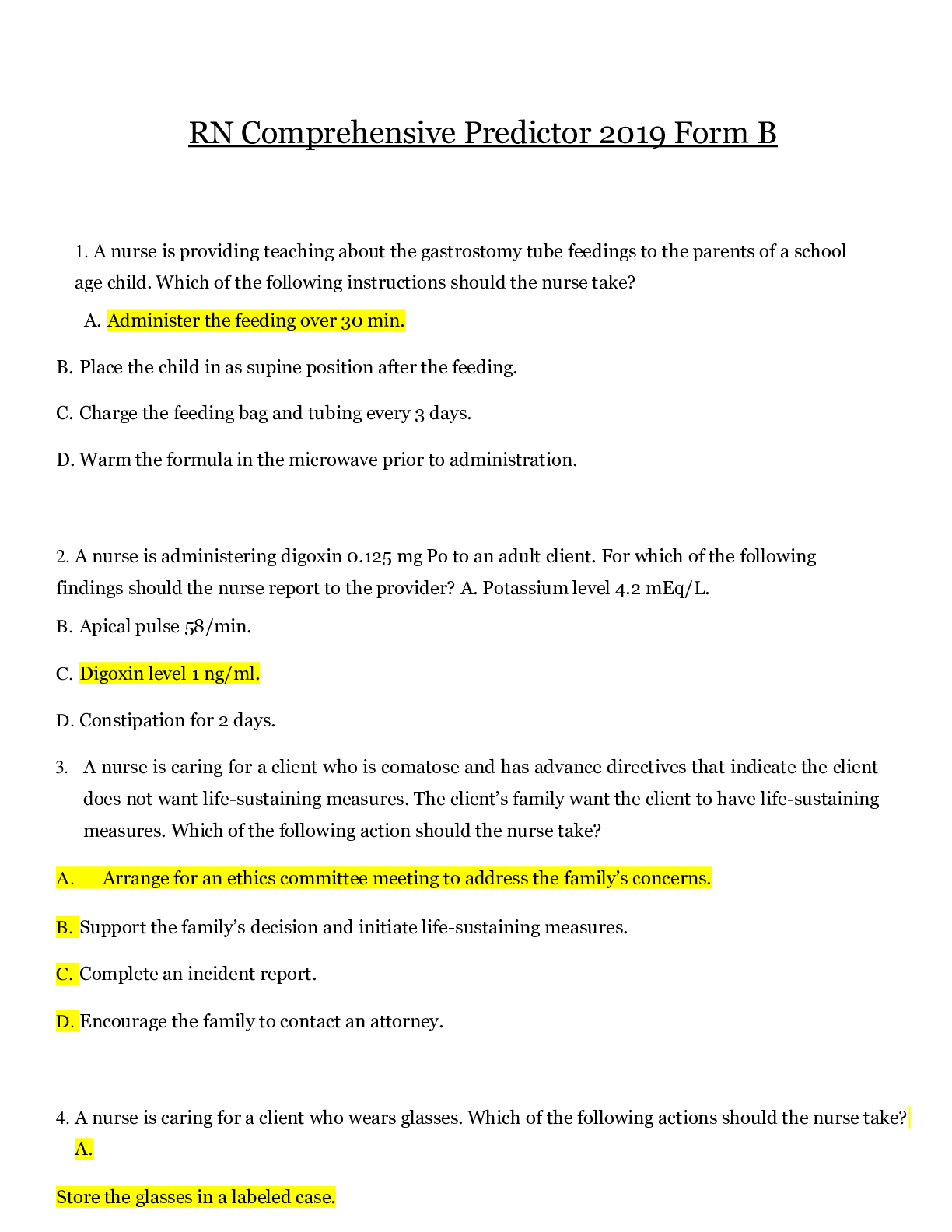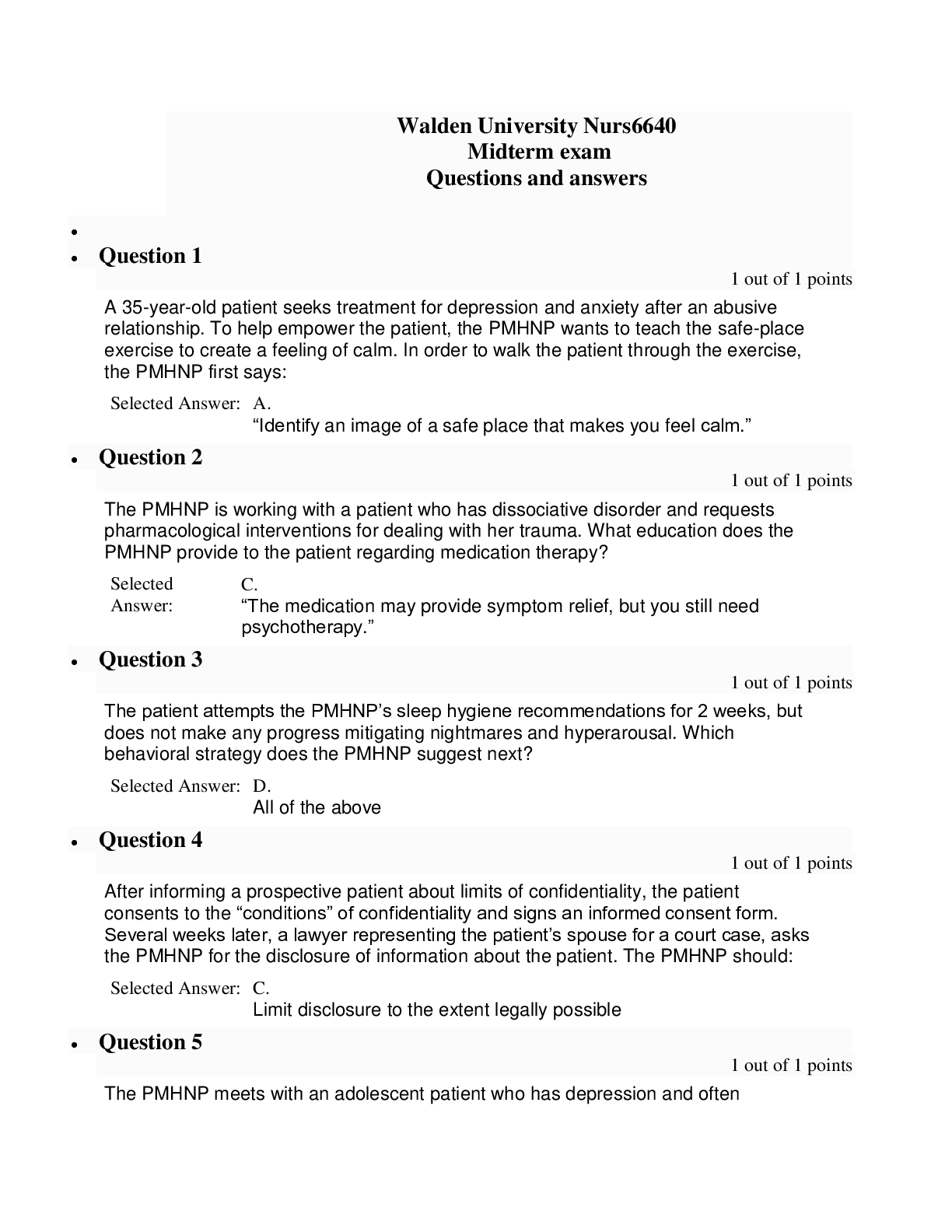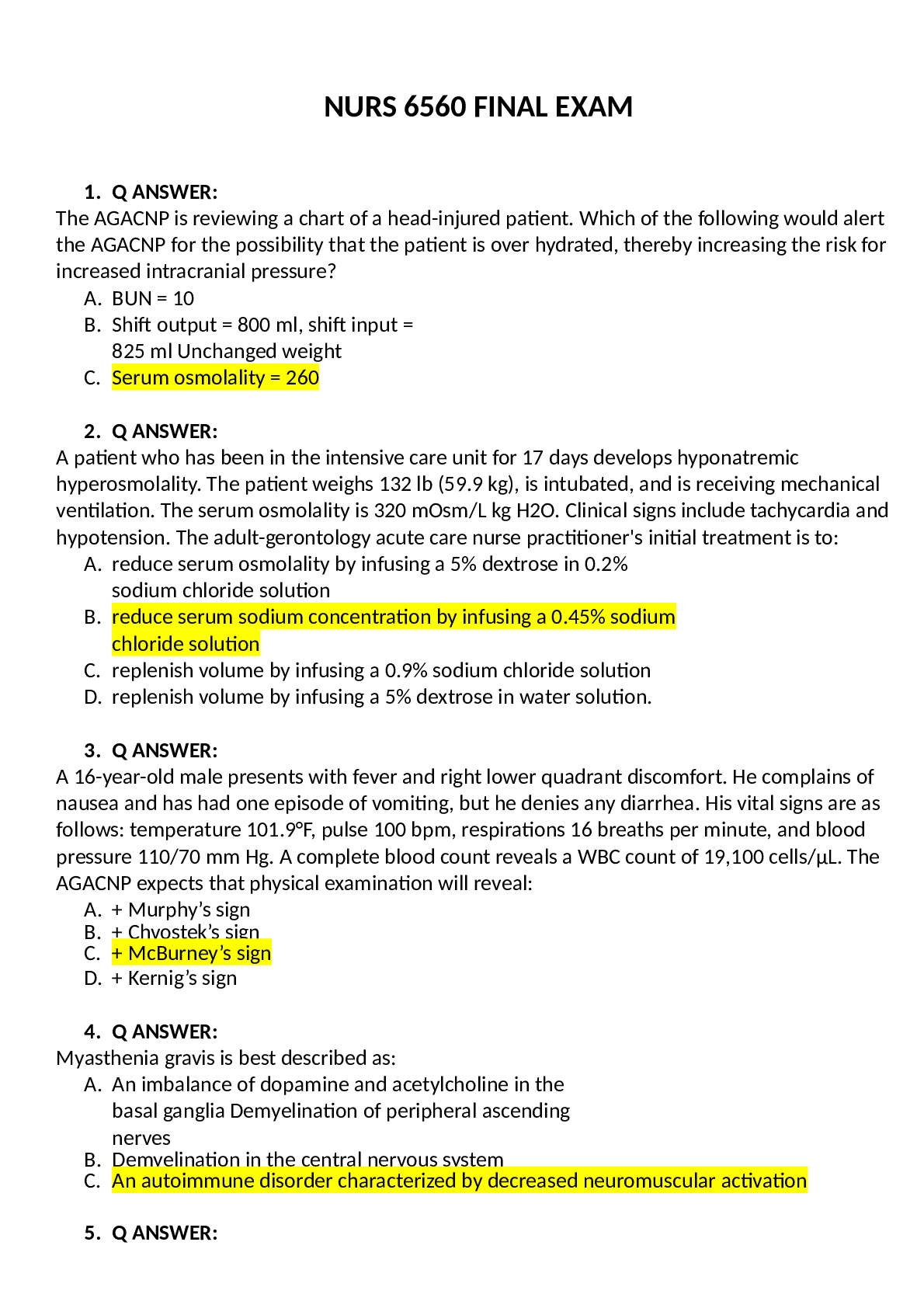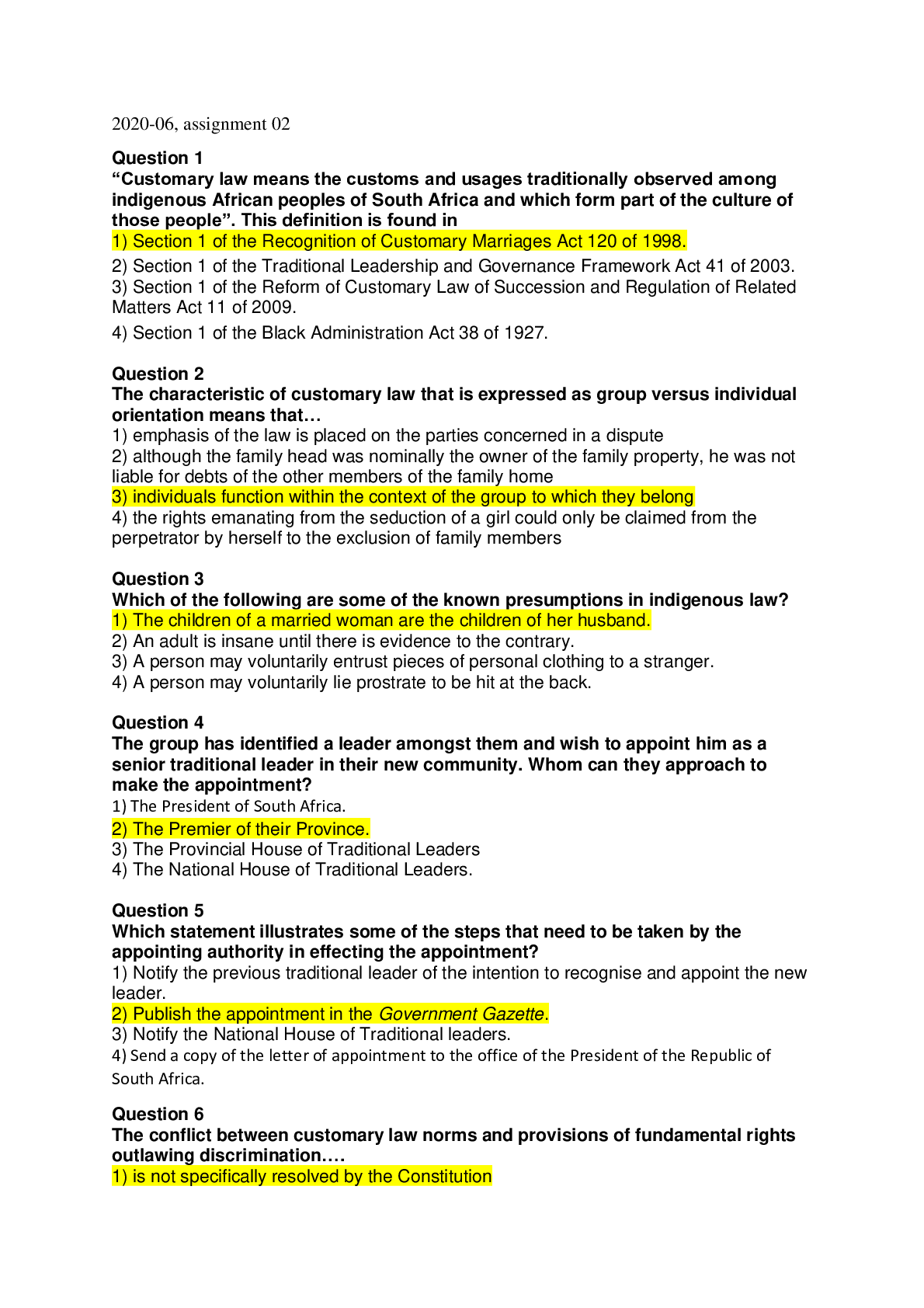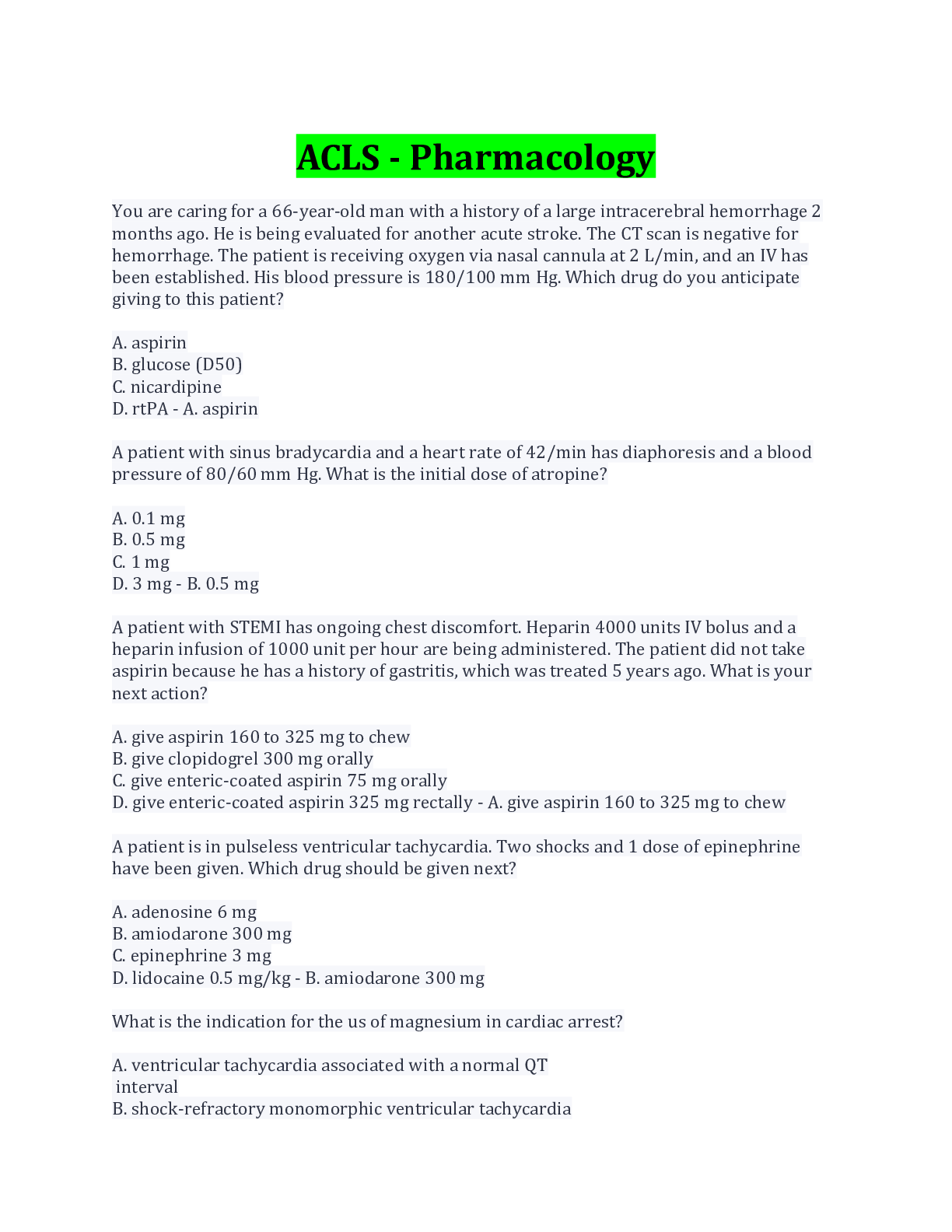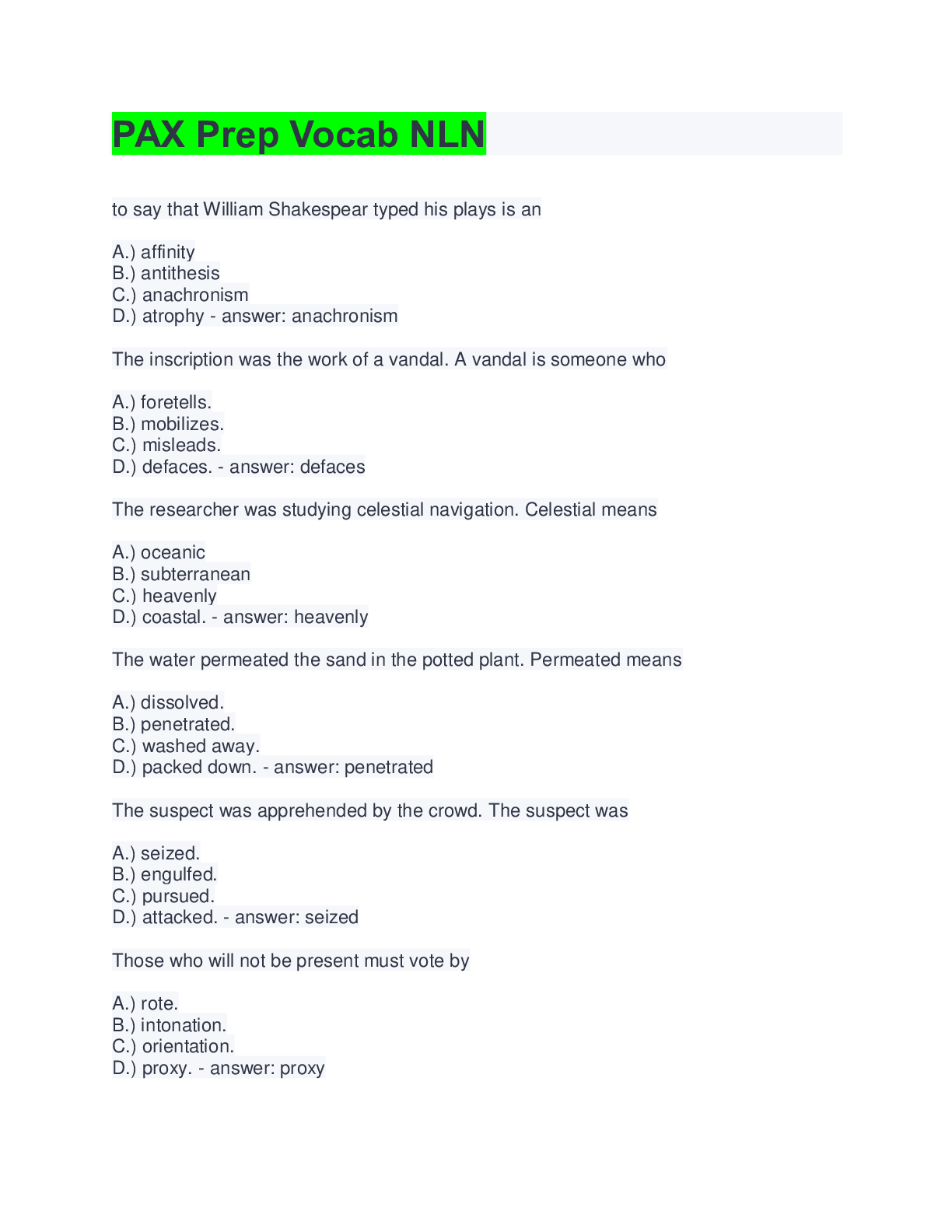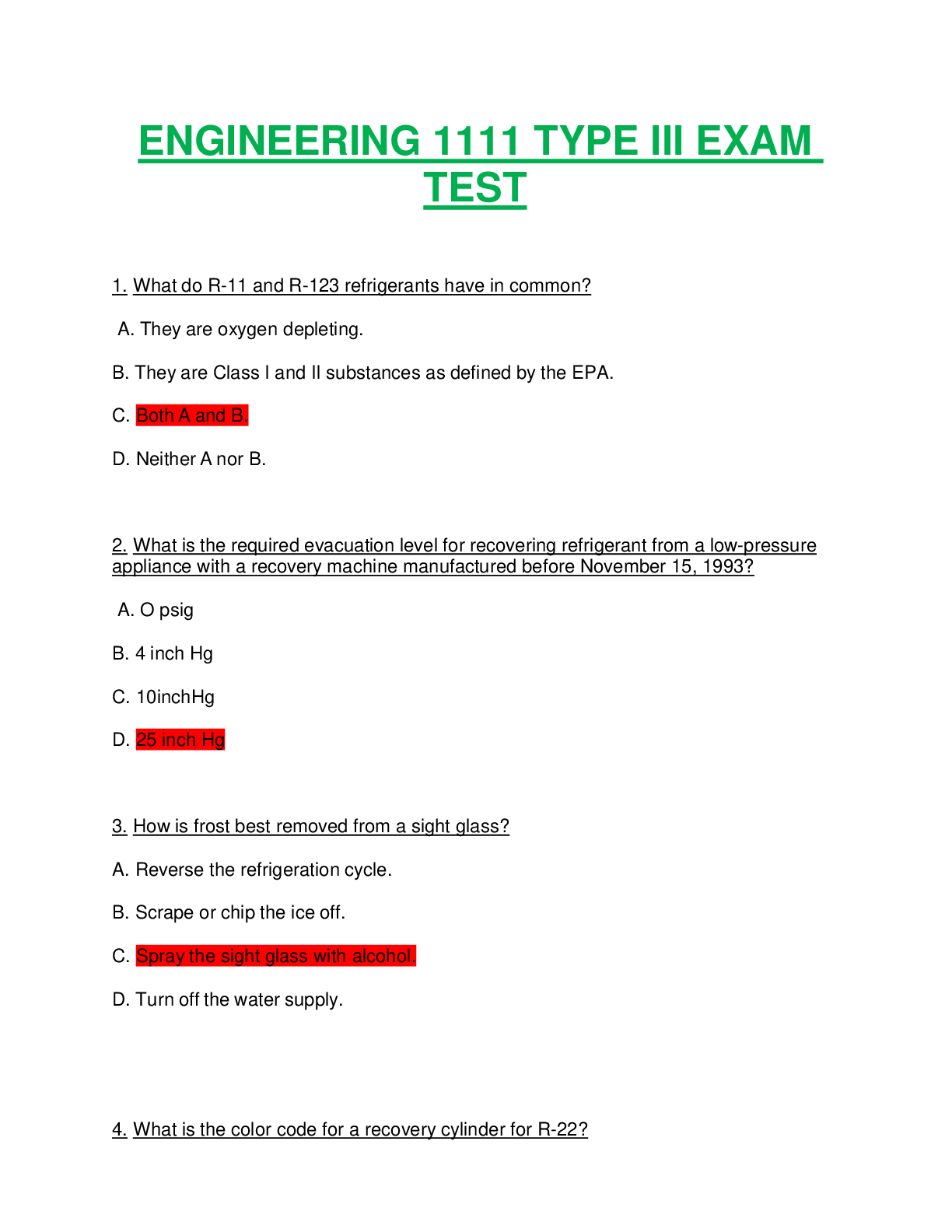IND 2601 MULTIPLE QUESTIONS AND ANSWERS-LATEST REVIEW
Document Content and Description Below
IND 2601 MULTIPLE QUESTIONS AND ANSWERS-LATEST REVIEW Customary law means the customs and usages traditionally observed among indigenous African peoples of South Africa and which form part of the cult... ure of those people”. This definition is found in 1) Section 1 of the Recognition of Customary Marriages Act 120 of 1998. 2) Section 1 of the Traditional Leadership and Governance Framework Act 41 of 2003. 3) Section 1 of the Reform of Customary Law of Succession and Regulation of Related Matters Act 11 of 2009. 4) Section 1 of the Black Administration Act 38 of 1927. Question 2 The characteristic of customary law that is expressed as group versus individual orientation means that… 1) emphasis of the law is placed on the parties concerned in a dispute 2) although the family head was nominally the owner of the family property, he was not liable for debts of the other members of the family home 3) individuals function within the context of the group to which they belong 4) the rights emanating from the seduction of a girl could only be claimed from the perpetrator by herself to the exclusion of family members Question 3 Which of the following are some of the known presumptions in indigenous law? 1) The children of a married woman are the children of her husband. 2) An adult is insane until there is evidence to the contrary. 3) A person may voluntarily entrust pieces of personal clothing to a stranger. 4) A person may voluntarily lie prostrate to be hit at the back. Question 4 The group has identified a leader amongst them and wish to appoint him as a senior traditional leader in their new community. Whom can they approach to make the appointment? 1) The President of South Africa. 2) The Premier of their Province. 3) The Provincial House of Traditional Leaders 4) The National House of Traditional Leaders. Question 5 Which statement illustrates some of the steps that need to be taken by the appointing authority in effecting the appointment? 1) Notify the previous traditional leader of the intention to recognise and appoint the new leader. 2) Publish the appointment in the Government Gazette. 3) Notify the National House of Traditional leaders. 4) Send a copy of the letter of appointment to the office of the President of the Republic of South Africa. Question 6 The conflict between customary law norms and provisions of fundamental rights outlawing discrimination…. 1) is not specifically resolved by the Constitution 2) is directly regulated by section 2 and 36(i) of the Constitution 3) is directly regulated by section 5(8)(i) of the Constitution 4) is specifically resolved by the provisions of section 8 and 39(i) of the Constitution Question 7 The effect of the decision taken in the Moseneke case was that between 2002 and 2004, an intestate estate of a black person reported to the Master was administered in terms of … 1) customary law. 2) native law. 3) zulu code. 4) common law. Question 8 Ukuvusa custom may be applied if … 1) a married man dies childless. 2) an unmarried male dies. 3) a female dies childless. 4) the wife cannot bear children. Question 9 The Recognition of Customary Marriages Act 120 of 1998 recognizes polygynous marriages, defined as ………………….. 1) a woman marrying more than one man. 2) a man marrying more than one woman. 3) a woman marrying another woman. 4) a man marrying not more than one woman. Question 10 House property includes 1) Property of the family head’s mother ‘s house to which he has succeeded 2) Earnings of the family head through his occupation 3) Property acquired by an individual personally 4) Marriage goods (lobolo) received for the daughters Question 11 The effect of the ruling in the case of Gumede v President of the RSA 2009 (3) SA 152 (CC) is that 1) The proprietary consequences of marriages only entered before the commencement of the Act are now in community of profit 2) Both spouses in all customary marriage have split control over marriage property 3) Proprietary consequences of marriages entered before and after the commencement of the Act are in community of property. 4) None of the above is applicable Question 12 Which of the following traditional leadership positions in is NOT recognized in law? 1) Kingship –or Queenship. 2) Deputy Principal Leadership. 3) Deputy traditional leaders. 4) Senior traditional leadership. Question 13 A customary marriage can only be dissolved … 1) on the ground of the irretrievable breakdown of the marriage 2) by a family court, or a competent division of the High Court or a divorce court 3) by the death or malicious desertion of one spouse 4) where one party commits adultery resulting in the birth of a child. Question 14 Functions of the National House of traditional leaders include 1) Consider parliamentary Bills referred to it in terms of the Traditional Governance framework act 41 of 2003 2) Advise the district municipality or metropolitan municipality on matters pertaing to customary law 3) Participate in local programs that have the development of rural communities as an object 4) Participate in local initiatives that are aimed at monitoring Question 15 Which of the following is NOT an example of indigenous law determinations? 1) The allocation or refusal of residential and agricultural land 2) The permission or refusal of immigration or emigration 3) The permission or refusal to gather natural products from the communal land 4) The allocation of dates to families for burial purposes. CONTINUED Q$A… QUESTION 1 People voluntarily observe legal rules and the rules for living in African customary law because of the following factors: (1) the religious or sacral (holy) element of the law, private opinion and the knowledge that if a person is harmed, that person will endeavor to get compensation or will take measures to protect him or herself. (2) the religious or sacral (holy) element of the law, the knowledge that if a person is harmed, that person will endeavor to get compensation or will take measures to protect him or herself, fear of punishment and the fact that only the indigenous leaders in the community have a broad general knowledge of the law. (3) the religious or sacral (holy) element of the law, the knowledge that if a person is harmed, that person will endeavor to get compensation or will take measures to protect him or herself, public opinion, and fear of punishment. (4) the religious or sacral (holy) element of the law, the knowledge that if a person is harmed, that person will endeavor to get compensation or will take measures to protect him or herself, and the influence of the police, courts and judges in the community. QUESTION 2 One of the implications of section 211(3) of the Constitution of the Republic of South Africa is that … (1) the recognition and application of customary law is subject to legislation that specifically deals with customary law. (2) only customary courts may apply and therefore also recognize customary law. (3) the recognition and application of customary law is subject to the Black Administration Act 38 of 1927. (4) the Congress of Traditional Leaders of South Africa (CONTRALESA) will determine when customary law is applicable. QUESTION 3 Indicate which statement is NOT correct. The following can be regarded as good cause for a woman to terminate a betrothal agreement unilaterally: (1) The man enters into an indigenous marriage with another woman during the betrothal period. (2) The man’s morality, where a polygamous marriage was contemplated provided the woman condones this. (3) Continuous neglect, so that the woman’s guardian has to instruct the lover to proceed with the marriage. (4) The man pays too much attention to other women and neglects his betrothed and her family. QUESTION 4 General property would include … (1) earnings of family members, including the earnings of a midwife and medicine woman. (2) clothing, walking sticks, snuff boxes, necklaces and weapons. (3) property given to a woman on her marriage, such as household utensils and a certain beast that is given to her during her marriage, such as the ubulungu beast. (4) property of the family head’s mother’s house to which he has succeeded. QUESTION 5 In indigenous law … (1) a successor succeeds to the assets and all the debts of his predecessor in KwaZuluNatal. (2) succession is a duty that can be relinquished or ceded. (3) a successor may never be removed from the line of succession i.e. disinherited. (4) succession takes place only on the death of a predecessor, there is thus no question of succession while the family head is still alive. QUESTION 6 A traditional leader may hear and decide civil cases … (1) which are instituted by black people against black people. (2) of people residing anywhere in South Africa. (3) concerning nullity, divorce or separation in respect of a civil marriage between black people. (4) involving offences of murder in their communities. QUESTION 7 Which of the following courts are NOT recognised in terms of the Constitution to apply customary law in South Africa? (1) Courts of Traditional leaders (2) Magistrate courts (3) Labour Courts (4) The Supreme Court QUESTION 8 In terms of the Recognition of Customary Marriages Act ... (1) marriages not registered in terms of the Act are void. (2) parties to an unregistered marriage are liable to a fine. (3) Unregistered marriages are awarded the status of a union. (4) the customary marriage is not void for failure to register. QUESTION 9 Which of the following does NOT constitute a ground for justification in African customary criminal law? (1) Impossibility (2) Executing an official order (3) Institutional action (4) Lack of intent QUESTION 10 Which of the following is a constitutionally acceptable form of punishment in original customary law? (1) The death penalty (2) A fine (3) Banishment (4) Imprisonment QUESTION 11 The main principles of the African customary court are … (1) the onus is on the accused to prove his innocence in court; the sessions of the customary court are held in public; all court sessions are open to members of the public and may be attended by any adult person, even strangers; all parties must be present during the trial; legal representation was unknown; all proceedings were conducted orally and no written record of cases was kept. (2) the onus is on the accused to prove his innocence in court; the sessions of the customary court are held in camera; all court sessions are open to members of the public and may be attended by any adult person, even strangers; all parties must be present during the trial; legal representation was unknown; all proceedings were conducted orally and no written record of cases was kept. (3) the onus is on the accused to prove his innocence in court; the sessions of the customary court are held in public; all court sessions are open to members of the public and may be attended by any adult person, even strangers; all parties may not be present during the trial, thus judgment by default was known; legal representation was unknown; all proceedings were conducted orally and no written record of cases was kept. (4) the onus is on the accused to prove his innocence in court; the sessions of the customary court are held in camera; all court sessions are open to members of the public and may be attended by any person, even children; all parties must be present during the trial; legal representation was unknown; all proceedings were conducted orally and no written record of cases was kept. QUESTION 12 A traditional leader … (1) may decide on any matter concerning nullity, divorce or separation in respect of a civil marriage between black people. (2) may impose a punishment which entails death, mutilation, grievous bodily harm or imprisonment. (3) is competent to hear any crime in accordance with common law, African customary law or any statutory crime referred to by the Minister. (4) is prevented from punishing any person, including a non-black, for contempt of his court in facie curiae (in the face of the court). QUESTION 13 Indicate which statement is NOT correct. According to African customary law … (1) the head of an agnatic group is always liable for the conduct of members of his group. (2) a stick-fight is not a recognised cultural institution and therefore injuries sustained during such a fight would be unlawful and tantamount to assault. (3) it is accepted that a person may forcibly defend himself or his property, or other persons or their property, against an unlawful attack without being criminally liable. (4) a small child and an insane person are not criminally liable for their unlawful conduct. QUESTION 14 In former days, the crime of contempt of the ruler was punished in one of the following ways: (1) a warning (2) imprisonment (3) a fine (4) a reprimand QUESTION 15 Some of the powers and duties of the National House of Traditional Leaders include that (1) it may consider Parliamentary Bills referred to it by the Secretary to Parliament in terms of section 18 of the Traditional Leadership and Governance Framework Act 41 of 2003. (2) it must enhance co-operation between the House and the various provincial houses with a view to addressing matters of common interest. (3) it may perform tasks as may be determined by a member of the national Cabinet or as may be provided for in national legislation. (4) it must be consulted on provincial government development programs that affect ordinary communities. QUESTION 16 According to African customary law, the crime of rape occurs when a man … (1) unlawfully and intentionally hurts another’s body. (2) consents with a woman to have sexual intercourse. (3) uses violence to force a woman not married to him to have sex with. (4) uses violence to force a woman married to him to have sex with him. QUESTION 17 Succession to traditional leadership in customary law … (1) follows the principle of primogeniture. (2) is gender neutral. (3) is a hereditary system which follows the patrilineage. (4) only happens where the traditional leader dies without brothers. QUESTION 18 Which of the following is NOT an example of customary law determinations? (1) The allocation or refusal of residential and agricultural land. (2) The permission or refusal of immigration or emigration. (3) The permission or refusal to gather natural products from communal land. (4) The allocation of a date to families to conduct burials of their family members. QUESTION 19 ‘Kgosi ke kgosi ka batho ‘(A Chief is a Chief thanks to his people) means that the ruler must … (1) act in accordance with the will of his people. (2) consider the decisions of only his council when making decisions. (3) not be unfair when making administrative determinations. (4) consulted when members of his community make family decisions. QUESTION 20 One of the main objects of dispute resolution in customary law is ... (1) to determine the guilty party. (2) to assist the parties to be friends. (3) to reconcile the parties. (4) to share a meal after the trial. CONTINUED PRACTICE Q$A DOWNLOAD FOR MORE PRACTICE TO BEST SCORES [Show More]
Last updated: 1 year ago
Preview 1 out of pages
Instant download

Buy this document to get the full access instantly
Instant Download Access after purchase
Add to cartInstant download
Reviews( 0 )
Document information
Connected school, study & course
About the document
Uploaded On
Jun 05, 2021
Number of pages
Written in
Additional information
This document has been written for:
Uploaded
Jun 05, 2021
Downloads
0
Views
13

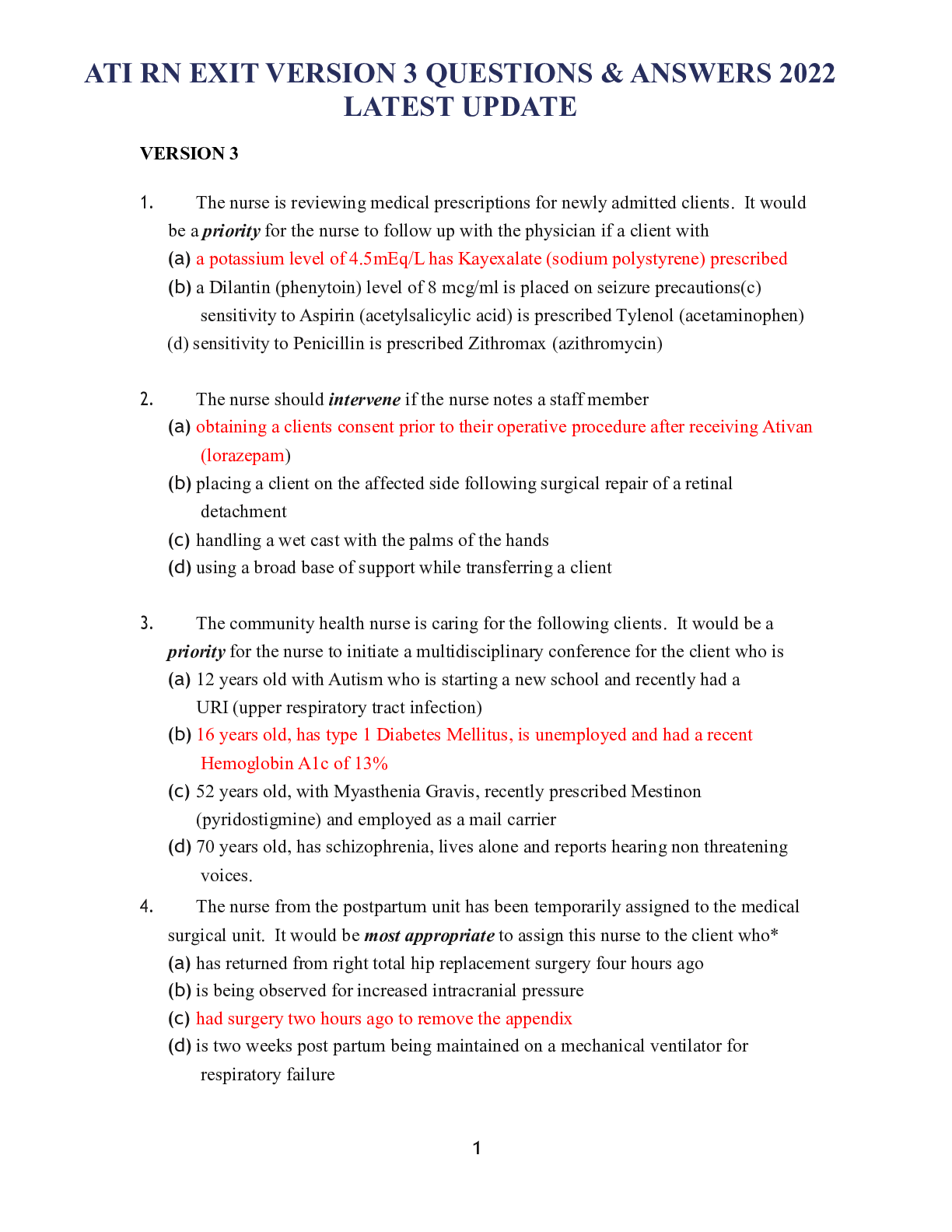
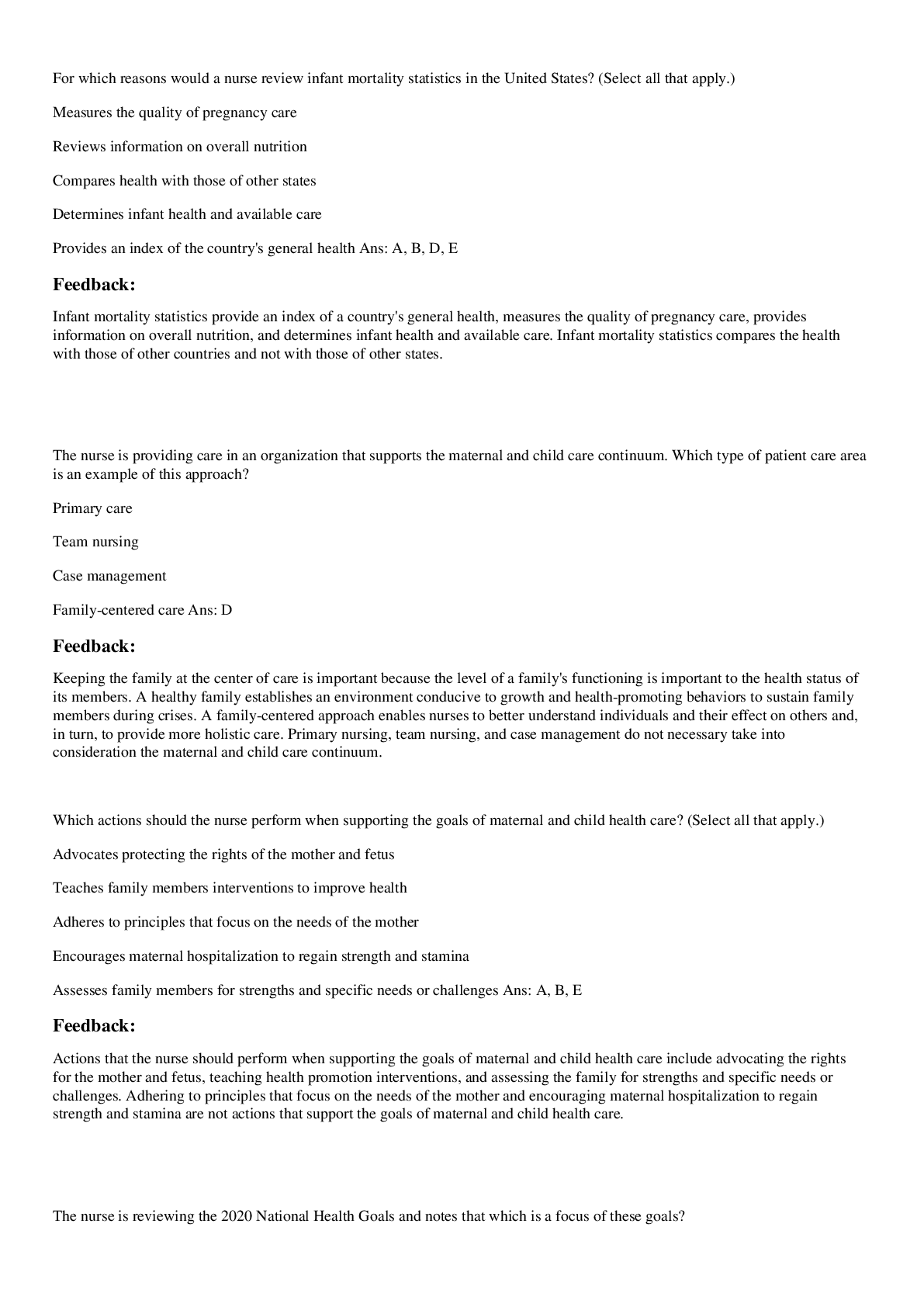
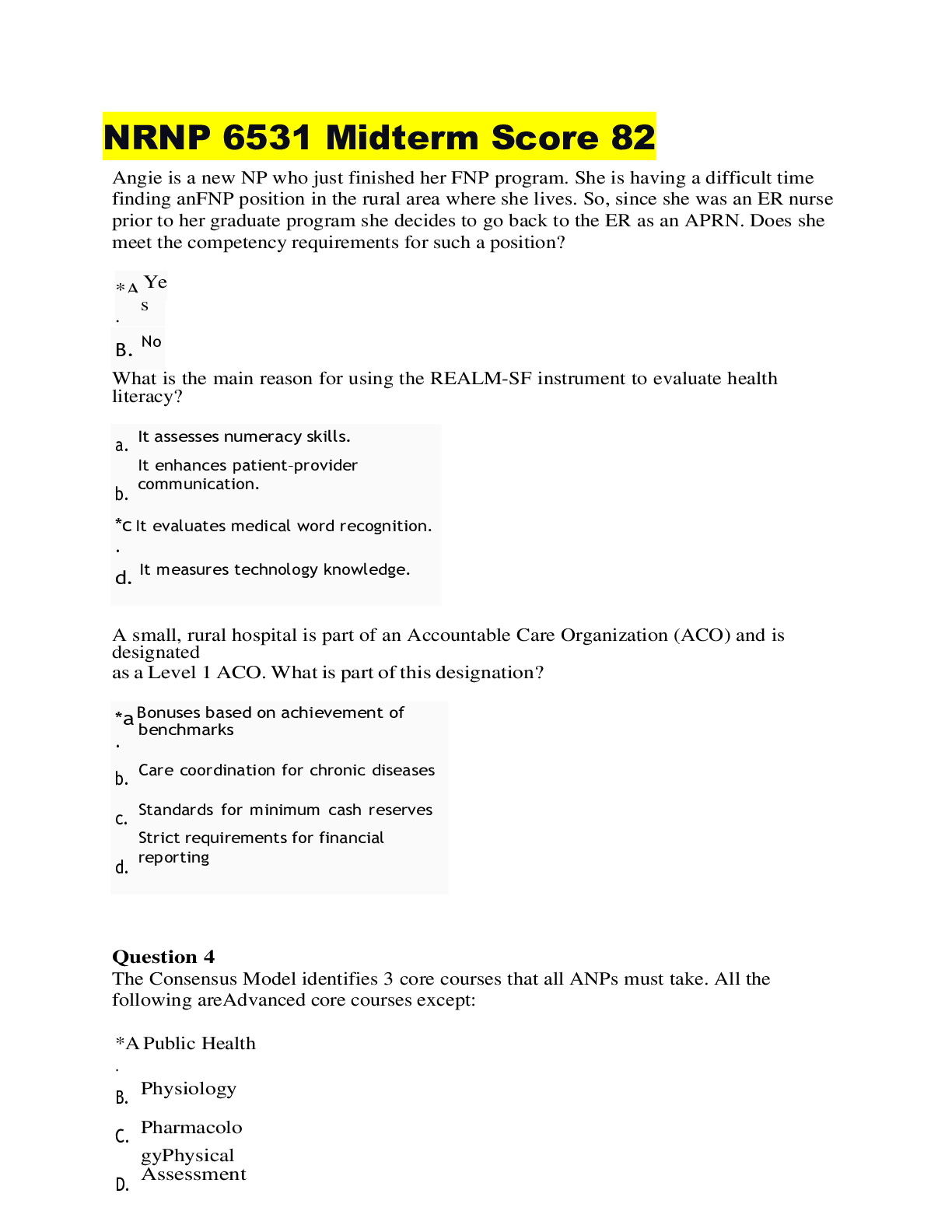
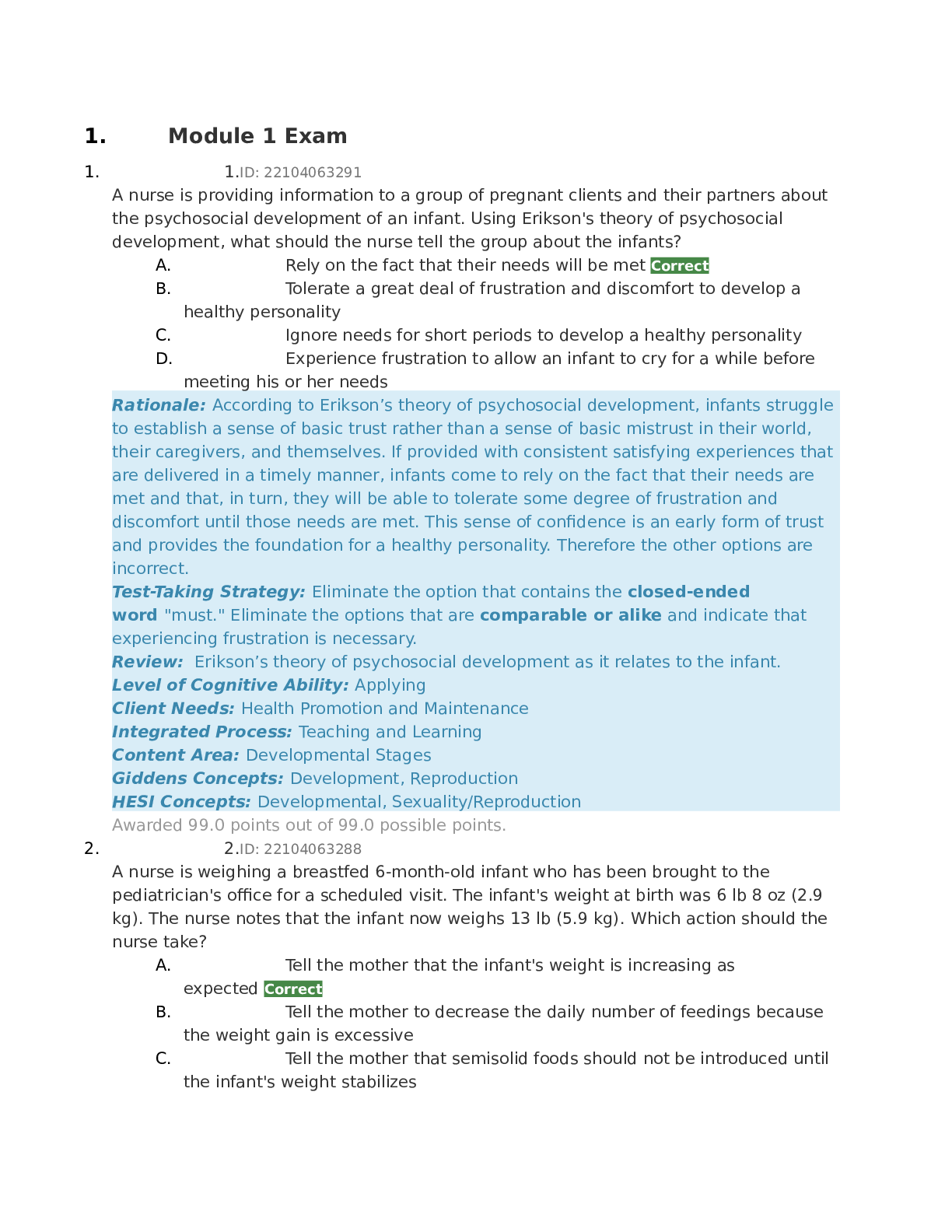
.png)
